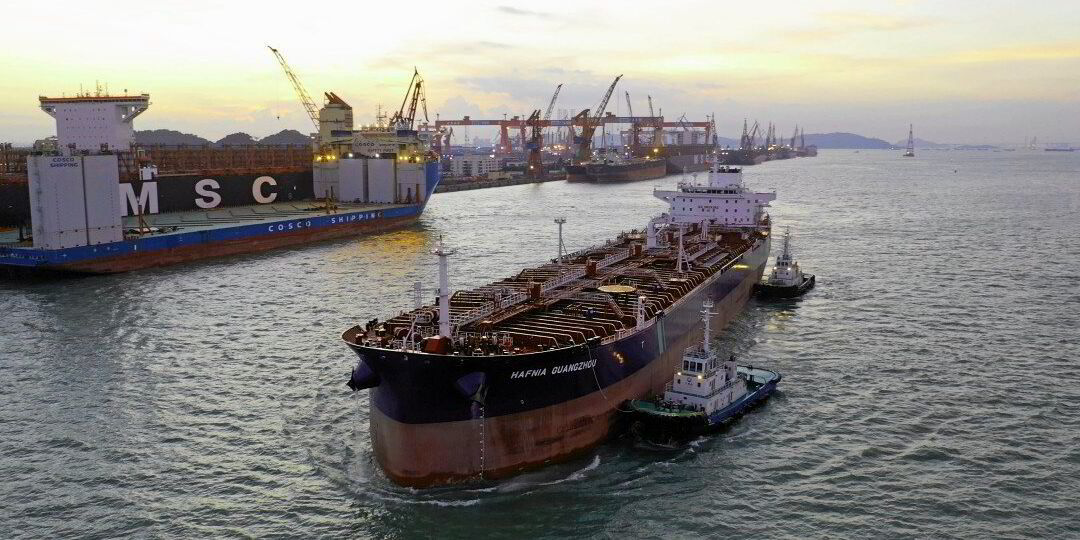Introduktion till den första leveransen
Japan har nyligen uppnått en betydande milstolpe genom att skicka sin “första någonsin”-last av mellandestillat, specifikt gasolja, till Argentina. Denna viktiga händelse kan bana väg för en ny framväxande handelsväg, vilket berikar den globala handeln.
Detaljer om lasten
Medusa, was located 40 nautical miles southwest of Crete, Hafnia Guangzhou, som byggdes 2019 och har en dödviktstonnage på 75 000, registrerades lasta en kombinerad last på cirka 68 000 ton gasolja och jetbränsle. Dessa produkter kom från två stora raffinaderier: Sendai och Kashima.
Implikationerna för handeln
Denna aldrig tidigare skådade leverans understryker inte bara Japans förmåga att tillhandahålla energiresurser globalt, utan kan också främja förbättrade handelsrelationer mellan Japan och Argentina. Sådana utvecklingar inom handeln indikerar ofta att logistiknätverk blomstrar, vilket understryker vikten av punktliga och pålitliga frakttjänster. Den handelsram som upprättas genom sådana transporter kan anpassas och expandera, optimera rutter och sänka kostnaderna för framtida transaktioner.
Logistikens roll
Utan effektiv logistik skulle sådana monumentala handelsframsteg kämpa för att frodas. Som logistikproffs vet är det avgörande att effektivisera varuflödet för att främja handel och säkerställa att företag fungerar smidigt. Varje komponent i logistikkedjan – från produktion till slutleverans – spelar en central roll.
Hur logistiken kan påverkas av nya handelsvägar
- Ökad efterfrågan på frakttjänster: Framväxten av nya handelsvägar kommer sannolikt att resultera i en ökning av efterfrågan på transporter, vilket leder till att logistikföretag anpassar och optimerar sina fraktverksamheter.
- Förbättrad samordning: Denna typ av internationell transaktion nödvändiggör förbättrad samordning mellan länder, hamnmyndigheter och rederier för att säkerställa leveranser i tid.
- Förfinade Spårningssystem: Med avancerade spårningssystem kan företag fastställa leveransstatus, vilket förbättrar transparensen i hela leveranskedjan.
- Större anpassningsförmåga: I takt med att logistiklandskapet utvecklas måste företag vara flexibla och anpassa sig till förändrade handelsmönster för att ta vara på nya möjligheter.
Förväntningar på framtida handel
Förändringen mot en ny handelsväg är inte bara en flyktig chans. Med pågående dialoger mellan exportörer och importörer lägger den den grundläggande grunden för varaktiga kommersiella relationer. Med tiden kan ökade handelsvägar bidra till att minska transportkostnaderna, eftersom större volymer varor kan transporteras mer ekonomiskt.
Potentiella utmaningar
Trots den optimistiska bilden kvarstår utmaningar. Företag har i uppgift att anpassa sina leveranskedjor, navigera tull och bestämmelser och se till att alla leveranser följer båda ländernas bestämmelser. Dessutom kan fluktuerande energipriser komplicera hanteringen av sådana handelsrelationer.
Slutsats
Sammanfattningsvis representerar Japans första gasoljeleverans till Argentina ett avgörande ögonblick i den internationella handelsdynamiken, vilket signalerar potentiella fördelar för båda nationerna när de utvecklar robusta handelsrelationer. Det understryker hur logistik och sjöfart kan utvecklas för att möta nya krav som introduceras av nya handelsvägar. Kärnan i dessa framsteg är GetTransport.com, och erbjuder prisvärda och mångsidiga globala frakttransportlösningar. Oavsett om det gäller att underlätta kontorsflyttar, fraktleveranser eller transportera tunga föremål som möbler eller fordon, förenklar GetTransport.com logistiken avsevärt, vilket gör att företag kan fokusera på det som verkligen betyder något – att utveckla sin verksamhet.
Även de mest fördelaktiga recensionerna och ärliga återkopplingen kan knappast jämföras med personlig erfarenhet. Som användare av GetTransport.com kan man hitta pålitlig godstransport till konkurrenskraftiga priser, vilket säkerställer välgrundade beslut utan onödiga utgifter. Utforska bekvämligheten, prisvärdheten och det omfattande utbudet som erbjuds av GetTransport.com för din nästa frakt. Boka din resa.

 Japans första last av gasolja till Argentina signalerar ny handelsväg">
Japans första last av gasolja till Argentina signalerar ny handelsväg">